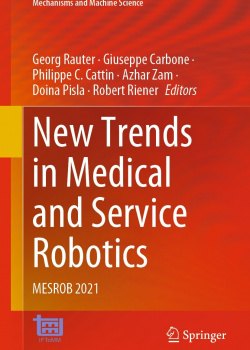

Designing Adaptive Nonlinear Controller for Optimal Tracking of Laparoscopic Robotic Arm with Nonholonomic Constraints
Laparoscopic surgery is one kind of minimally invasive surgery in which surgeons can control and evaluate the tracking of the robot via special monitoring. Preserving stability, precise tracking, and uncertainties estimation are essential factors in controller design for these systems.
Designing autonomous graspers would improve the perception of surgeons and reduce the unwanted errors of operations. An adaptive inverse dynamic controller is proposed in this paper to improve the performance of the tracking desired trajectories for gripper of the surgical robots used in laparoscopic surgeries. By considering nonholonomic conditions for the grasper of the robot, the workspace is generalized, and using the Ritz approximation method, the optimal steering problem for nonholonomic gripper has been solved. In this case, the surgeon can steer the gasper of the surgical robot from any initial condition to any desired destination point. The performance of the proposed controller for nonholonomic conditions is demonstrated by simulation results.
Book Chapter